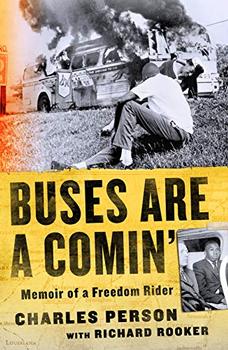Summary | Excerpt | Reading Guide | Reviews | Beyond the Book | Readalikes | Genres & Themes | Author Bio

Memoir of a Freedom Rider
by Charles Person, Richard Rooker
From Papa I learned the love of learning and precision and patience and waiting. Within a few years, waiting would become more challenging than looking at Papa's coin collection, but patience would serve me well in solitary confinement.
From Dad I learned perseverance through difficulty. Difficulties this Bradley Street boy could not imagine would become reality before long. Difficulty likes to persevere in life, so I would have to persevere to overcome it. I learned that from Dad.
From Bradley Street I learned to be proud of where I came from. I learned how to be decent. I loved living on Bradley Street. And I love that I came from the Bottom. The poorest part of Atlanta protected and sheltered me from a world of which I was unaware, but a world I would come to realize did not value me the way Mom and Dad and Papa and Bradley Street did. Soon I would wake up from the cocoon my Bradley Street blanket wrapped me in during my youngest years. The chrysalis would first get cracks, fissures, and fractures; then it would fall off, and the real world would reveal itself to me. My slumber would come to an end. My awakening was at hand. Soon I would stretch my wings and try to fly.
2
Awakenings
My parents handled race by not handling race. They taught us to be human. They taught us to be fair, taught us the value of hard work and responsibility. We were all taught to be of service.
—David Forbes, cofounder of SNCC1
The cracks in the chrysalis of my youth first appeared when I took my first real job at age twelve at a bowling alley. My uncle George was the maintenance manager at Briarcliff Lanes, and he got me hired to help tidy up the place after he finished his shift and went home each night. My job was to pick up soda bottles, empty wastebaskets, and remove debris when customers completed their games. That was okay, but I could see the future in working at Briarcliff was being a pinboy. Pinboys had spunk. Pinboys, at least in their minds, were the stars of the place. They were a team. They were cool. They were it. And pinboys made more money than I did. As soon as I learned the ins and outs of Briarcliff Lanes, my dreams of sliding down that fire pole at Fire Station 6 were put on hold. What I wanted to be in life was a pinboy.
The bowling alley was in Briarcliff Plaza in Virginia-Highland—an exclusive white section of Atlanta two miles north of 21 Bradley. All pinboys at Briarcliff were black. Most were high school students. When I started my pinboy career, I was not only the youngest, but also the shortest. Being four feet eleven and weighing eighty-five pounds earned me new names. Here I wasn't Charles or Tony or Bo, I was Shrimp, Mouse, Atom. Everybody knew I liked science in school, so they turned that into a negative. Growing up has growing pains. Growing up small has special ones. Friends and classmates found fun in making fun of me. I suppose I did the same to them. I just don't remember. The pain inflicted on me sticks in my memory. The pain I inflicted on them I've long forgotten.
Picture a bowling alley today. Briarcliff is not that picture. No automatic pin returns. No elevated screens projecting scores. No bright lights illuminating lanes. Or splashy images of falling giant bowling pins on distant walls. No bright digital displays with enticing advertisements. Or shiny waxed lanes reflecting lights, pins, balls, and prosperity. No. Each of twelve dull lanes ended at a small pit that collected downed pins. Behind each pit, a four-foot brown padded-leather cushion smothered flying projectiles and dropped them into the pit for us to retrieve. A slender wooden railing divided each lane and created a perch for us. We pinboys sat atop these railings ready to spring into action after each rolled ball. Our job was to reset the pins, recover the ball, and slide it down one of the ball returns as fast as we could. Sometimes bowlers rolled the second ball to speed up play before we were back on our perch, so agility and quickness mattered. Some boys straddled the wooden railing; others sat with both legs on one side. I straddled. That meant I needed to swing only one leg over the divider to get to work. To me, that created efficiency. Customers admired my hustle and my efficiency.
Excerpted from Buses Are a Comin' by Charles Person and Richard Rooker. Copyright © 2021 by Charles Person and Richard Rooker. Excerpted by permission of St. Martin's Press. All rights reserved. No part of this excerpt may be reproduced or reprinted without permission in writing from the publisher.




Only when we are no longer afraid do we begin to live
Click Here to find out who said this, as well as discovering other famous literary quotes!
Your guide toexceptional books
BookBrowse seeks out and recommends the best in contemporary fiction and nonfiction—books that not only engage and entertain but also deepen our understanding of ourselves and the world around us.